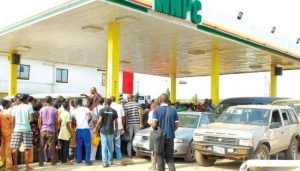
Nigerians are bracing for an imminent increase in petrol prices, following the Nigerian National Petroleum Company Limited‘s (NNPC Ltd) decision to terminate its exclusive purchase agreement with Dangote Refinery, according to reports from Premium Times.
As the fallout from this significant policy shift unfolds, new pricing data reveals that the cost of petrol at retail outlets across the country is expected to climb to a staggering minimum of ₦991.21 per litre, up from the current ₦897/litre.
The implications of this decision will be felt nationwide, as consumers in major cities prepare for steep price hikes.
In a detailed review of the Premium Motor Spirit (PMS) pricing framework, obtained from the Nigerian Midstream and Downstream Petroleum Regulatory Authority (NMDPRA), projections indicate that petrol prices will vary significantly by location.
In Abuja, petrol could soar as high as ₦1,029.01 per litre, while Lagos residents may pay ₦991.21.
Other cities are also expected to experience sharp increases, with prices reaching ₦1,040.31 in Kano, ₦1,007.35 in Calabar, ₦1,045.72 in Sokoto, and ₦1,059.39 in Maiduguri. Additionally, petrol in Ibadan may cost ₦999.27, and in Enugu, it could rise to ₦1,022.63.
The decision by NNPC Ltd to end its exclusive agreement with Dangote Refinery opens the market for other marketers to directly purchase petrol, allowing them to negotiate prices independently.
This move aligns with the trend towards deregulation in Nigeria’s petroleum sector, where refineries are now able to engage with marketers on a “willing buyer, willing seller” basis.
NMDPRA’s documentation highlights the subsidy payment differentials previously covered by NNPC, illustrating the potential impact on consumers as these subsidies are withdrawn.
The recent PMS data, which reflects trading averages from September 23 to October 4, 2024, shows that the NNPC was subsidizing petrol by an average of ₦134.5 per litre across the eight cities analyzed.
In all the cities the document referred to, the average NAFEM FX rate used to calculate the pump price was ₦1,604.89/USD.
In Lagos State, the indicative pump price is ₦991.21, while the actual NNPC pump price is ₦855 per litre. This indicates that NNPC pays about ₦136.21 as its estimated differential price.
In Abuja, the indicative pump price is ₦1,029.01 while the actual pump price is ₦897 per litre, meaning that the NNPC pays about ₦132.01 as an estimated differential.
For Kano, the indicative pump price is ₦1,040.31 per litre, while the actual pump price is ₦904, indicating an estimated differential price of ₦136.31.
In Calabar, the indicative pump price is ₦1,007.35; the actual pump price is ₦885 per litre, and the estimated differential price is ₦122.35.
In Sokoto, the indicative pump price is ₦1,045.72 per litre, while the actual pump price is ₦904, indicating an estimated differential of ₦141.72.
In Maiduguri, the indicative pump price is ₦1,059.39, while the actual pump price is ₦924, indicating an estimated differential of ₦135.39.
In Ibadan, the indicative pump price is ₦999.27 per litre while the actual pump price is ₦865, and the estimated differential price is ₦134.27.
Enugu’s indicative pump price is ₦1,022.63, the actual pump price is ₦885 per litre, and the estimated differential price is ₦137.63.
Sources told Premium Times on Monday that the pump price may even be higher than estimated, depending on crude oil prices and prevailing foreign exchange rates.
The post How Much Petrol May Cost Across Nigeria As NNPC Quits Off-Taker Role appeared first on Naija News.


